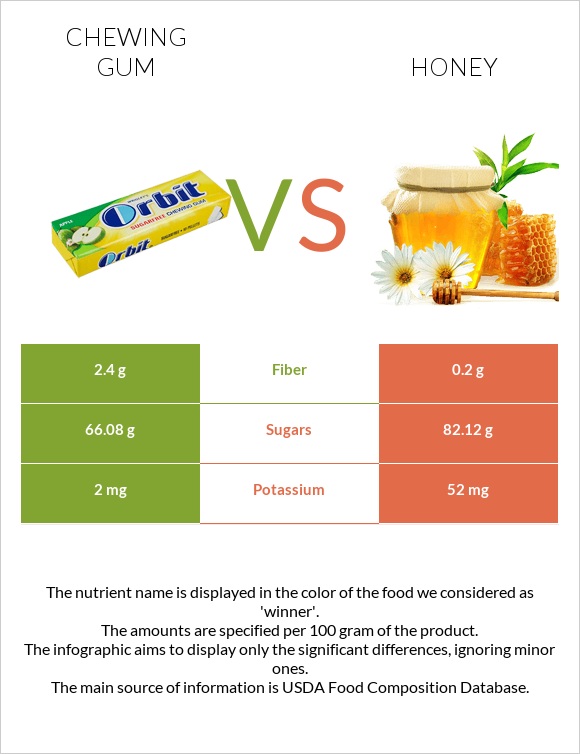Chewing gum vs. Honey — In-Depth Nutrition Comparison
Compare
How are chewing gum and honey different?
- Chewing gum is higher in fiber; however, honey is richer in iron.
Chewing gum and Honey are the varieties used in this article.
Infographic

Infographic link
Mineral Comparison
Mineral comparison score is based on the number of minerals by which one or the other food is richer. The "coverage" charts below show how much of the daily needs can be covered by 300 grams of the food.
| Contains less SodiumSodium | -75% |
| Contains more MagnesiumMagnesium | +∞% |
| Contains more CalciumCalcium | +∞% |
| Contains more PotassiumPotassium | +2500% |
| Contains more IronIron | +∞% |
| Contains more CopperCopper | +∞% |
| Contains more ZincZinc | +∞% |
| Contains more PhosphorusPhosphorus | +∞% |
| Contains more ManganeseManganese | +∞% |
| Contains more SeleniumSelenium | +33.3% |
Vitamin Comparison
Vitamin comparison score is based on the number of vitamins by which one or the other food is richer. The "coverage" charts below show how much of the daily needs can be covered by 300 grams of the food.
| Contains more Vitamin CVitamin C | +∞% |
| Contains more Vitamin B2Vitamin B2 | +∞% |
| Contains more Vitamin B3Vitamin B3 | +∞% |
| Contains more Vitamin B5Vitamin B5 | +∞% |
| Contains more Vitamin B6Vitamin B6 | +∞% |
| Contains more FolateFolate | +∞% |
All nutrients comparison - raw data values
| Nutrient |  |
 |
DV% diff. |
| Fructose | 40.94g | 51% | |
| Fiber | 2.4g | 0.2g | 9% |
| Carbs | 96.7g | 82.4g | 5% |
| Iron | 0mg | 0.42mg | 5% |
| Copper | 0mg | 0.036mg | 4% |
| Calories | 360kcal | 304kcal | 3% |
| Manganese | 0mg | 0.08mg | 3% |
| Vitamin B2 | 0mg | 0.038mg | 3% |
| Zinc | 0mg | 0.22mg | 2% |
| Vitamin B6 | 0mg | 0.024mg | 2% |
| Protein | 0g | 0.3g | 1% |
| Vitamin C | 0mg | 0.5mg | 1% |
| Calcium | 0mg | 6mg | 1% |
| Potassium | 2mg | 52mg | 1% |
| Phosphorus | 0mg | 4mg | 1% |
| Vitamin B3 | 0mg | 0.121mg | 1% |
| Vitamin B5 | 0mg | 0.068mg | 1% |
| Folate | 0µg | 2µg | 1% |
| Polyunsaturated fat | 0.137g | 0g | 1% |
| Fats | 0.3g | 0g | 0% |
| Net carbs | 94.3g | 82.2g | N/A |
| Magnesium | 0mg | 2mg | 0% |
| Sugar | 66.08g | 82.12g | N/A |
| Sodium | 1mg | 4mg | 0% |
| Selenium | 0.6µg | 0.8µg | 0% |
| Choline | 0mg | 2.2mg | 0% |
| Saturated fat | 0.042g | 0g | 0% |
| Monounsaturated fat | 0.079g | 0g | 0% |
| Tryptophan | 0.004mg | 0% | |
| Threonine | 0.004mg | 0% | |
| Isoleucine | 0.008mg | 0% | |
| Leucine | 0.01mg | 0% | |
| Lysine | 0.008mg | 0% | |
| Methionine | 0.001mg | 0% | |
| Phenylalanine | 0.011mg | 0% | |
| Valine | 0.009mg | 0% | |
| Histidine | 0.001mg | 0% |
Macronutrient Comparison
Macronutrient breakdown side-by-side comparison
Protein:
0 g
Fats:
0.3 g
Carbs:
96.7 g
Water:
2.6 g
Other:
0.4 g
Protein:
0.3 g
Fats:
0 g
Carbs:
82.4 g
Water:
17.1 g
Other:
0.2 g
| Contains more FatsFats | +∞% |
| Contains more CarbsCarbs | +17.4% |
| Contains more OtherOther | +100% |
| Contains more ProteinProtein | +∞% |
| Contains more WaterWater | +557.7% |





